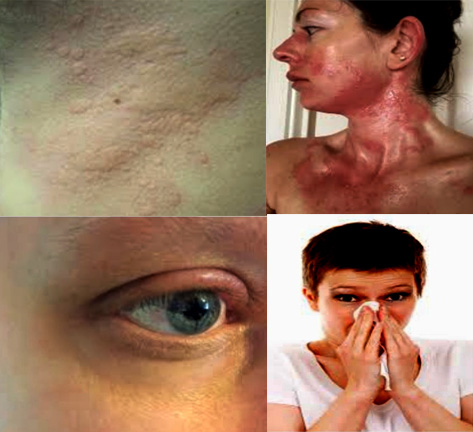 |
Allergy
|
Allergies:
One of the faults of our body's immune system is
allergies, where the immune system becomes overactive. Allergy is a reaction of
the body's immune system against a foreign object. That external object is not
harmful to other people. In healthy people, the body's immune system fights off
germs. But in people with allergies, the immune system becomes over-active
against non-harmful foreign substances, called allergens. People who have allergies
are sensitive to more than one substance. Both environmental and genetic
factors play an important role in allergic diseases.
Allergens:
- Tiny germs or mites.
- Mold.
- Flower pollen.
- Cold and dry weather.
- Food.
- The dust of the house.
- Animal fur and hair.
- Insect bites.
- Some chemicals including medicines.
- Cosmetics.
- Acute odor.
Symptoms of allergy:
The different types of allergy symptoms are:
Dust allergies:
- Cold or stuffy nose
- Sneezing
- The eyes become red, watery and itchy
- Coughing, wheezing, shortness of breath
Allergic rhinitis:
- Cold or stuffy nose.
- Itching of the eyes and skin.
- Sneezing.
- Weakness due to fatigue and sleep disturbances due to nasal congestion.
Skin allergies:
- Common symptoms of skin allergies are redness, itching and swelling of the skin.
Eczema and contact dermatitis:
- People with eczema often have dry skin. Itching occurs and the skin becomes stiff. In some cases, itchy skin breaks down and the juice starts to come out. This means that there is an infection. Children may have eczema on the face, body joints or behind the ears. In adults, these shots can be in addition to the hands and feet. In case of contact dermatitis, the symptoms may be such that the place has come in contact with allergens.
Acne:
- When there is acne, the skin becomes red and swollen. Some places turn red and become elevated in different sizes and can occur anywhere on the body. One of the conditions of this disease is called angioedema, where the lower layers of the skin are also affected. It can occur around the eyes, lips or cheeks. Sometimes it can be in the genitals or even inside the throat or abdomen.
Insect and pet allergies:
Symptoms of allergies to pets are similar to allergies to
dust. They can be seen when they come in contact with pets. Symptoms of insect
allergies include:
- Swelling of the cheeks, lips, throat and tongue.
- It is difficult to breathe.
- Where insects bite or sting, there are itching, rashes and small blisters on the inside that contain pus-like substances.
- Wanting to vomit or vomiting.
- Abdominal cramps.
Food allergies:
Symptoms of a food allergy can occur just after or a few
hours after eating. Symptoms include redness of the skin, itching, runny nose,
nausea, vomiting, constipation and diarrhea. In some cases, food allergies can
lead to another serious illness called anaphylaxis, the symptoms of which are:
- Shortness of breath.
- Swelling of the tongue, throat and lips.
- Tingling in the hands and feet
Diagnosis of allergy:
- Blood tests: Especially to see if there are high levels of eosinophils in the blood.
- Serum IgE levels: IgE levels are usually higher in allergic patients.
- Skin prick test: In this test, the patient's skin is tested with different allergens and in this test, the patient is allergic to certain things.
- Patch test: This test is also done on the patient's skin.
- Chest X-ray: Before starting treatment for asthma, a chest X-ray must be done to see if there is any other cause of shortness of breath.
- Spirometry: This test gives an accurate idea of the condition of the patient's lungs.
Allergy treatment:
Treatment of allergies depends on the history of the
disease, how severe the symptoms are, and the results of the allergy test. The
steps of treatment are:
Avoiding allergens:
The best way to avoid allergies is to avoid allergens as
far as possible. It takes less medicine and does not require removal of the
source. Keeping your nose clean by "watering" regularly can help you
avoid airborne allergens.
Prescription:
Anti-allergy medications, such as decongestants with
antihistamines, help reduce swelling in allergies. A chemical called histamine
is released into the body during allergies. Antihistamines disrupt this
secretion and release runny nose and stuffy nose. Decongestants reduce swelling
of the swollen membranes inside the nose. Corticosteroids are used to stop the
spread of skin rashes.
Immunotherapy:
Immunotherapy is recommended in some patients. These
patients are allergic to flower pollen, pets, insects and asthma. This
treatment gives the patient the ability to tolerate allergens. As a result, the
symptoms are less. For food allergies, immunotherapy still cannot prevent them.
However, many studies are being conducted to verify its effectiveness.
Lifestyle control:
The right way to avoid allergies is through proper
management. Allergy can be controlled by regular consultation with a doctor.
Avoiding allergens will reduce the source and reduce allergies. If a patient is
likely to have a severe allergic reaction, epinephrine injections should be
kept close at hand. It is the only treatment for acute allergies and it cannot
be obtained without a doctor's prescription. This type of patient needs to have
an identity card with him with the details of his disease so that if he cannot
speak, it will not be difficult for him to get treatment.




0 Comments